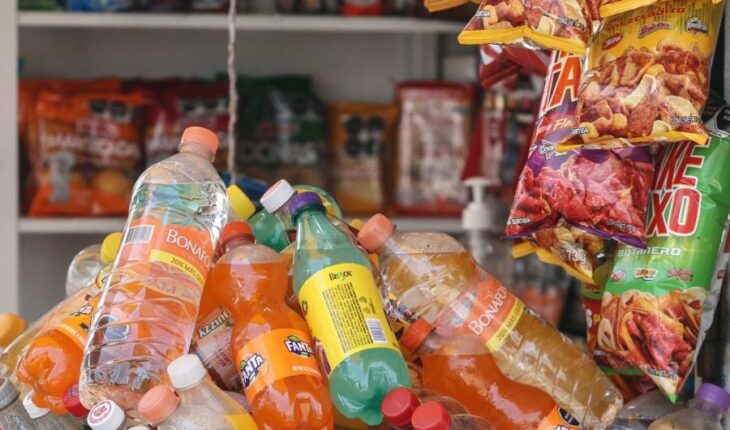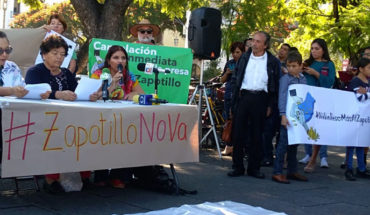Eight years after it was prohibited to sell junk food within basic education schools, in most of these institutions in Mexico City this is not complied with and unhealthy foods continue to be sold, according to analysis of civil organizations and tours carried out by this media.
The sale of junk food continues in up to nine out of 10 schools, according to the organization El Poder del Consumidor.
A six-year-old girl who attends first grade in a private school, the State of Mexico Institute, in the Azcapotzalco mayor’s office, says that in the cooperative of her school they sell potatoes, Doritos, Clown Popsicles, chocolates, Mammoths and artificial juices, among other products.
The General Guidelines for the Sale and Distribution of Prepared and Processed Food and Beverages in the Schools of the National Educational System, issued in 2014, indicate specifications in terms of portion and caloric content for the sale of food.
Liliana Bahena, coordinator of the Mi Escuela Saludable project, of El Poder del Consumidor, explains that this implies that products such as soft drinks, light soft drinks, flavored milk with added sugars, salty snacks, cookies, cupcakes, sweets, desserts and yogurt with sugar cannot be sold.
In contrast, the guidelines indicate that the school snack should consist of vegetables and fruits, whole grain (it is recommended to consume a portion of amaranth, oats or granola without added sugar), oilseeds (peanuts, nuggets, dried pea, sunflower seeds, almonds, walnuts) and legumes (chickpeas or dried beans without salt), as well as simple drinking water on demand.
But in the Day Secondary 300, also in Azcapotzalco, three students report that, although they no longer sell soft drinks, potatoes or cupcakes, in their school they continue to sell fried foods, sweets, canned juices and in cardboard containers.
Two students from the Revolution Elementary School, in the Doctores neighborhood, Cuauhtémoc mayor’s office, also testify that the guidelines to prohibit junk food are not fully complied with where they study.
The girls— in the presence of their mothers—say Political Animal that, although they no longer sell soft drinks or potatoes, but cakes, tacos, enchiladas and similar foods, there is still sale of ice cream and cookies.
From the doors out
At the exit of Revolution Elementary School, two street vendors offer ice cream, popsicles and snacks. Further on, a stall sells flags, nachos and juices, and next door there is another with all kinds of sweets.
“It is useless that inside the school they try not to sell so much junk food if the children go out and see here on the way the stalls with sweets, potatoes and ice cream. Many ask for them and the parents buy them,” says the mother of one of the girls, who asks to omit their names.
Around the entrance of the primary school, where a kindergarten is located, at 12:30 a little girl comes out of her mother’s hand. The first thing he sees are the four potato and candy stalls right in front of the door.
In the Secondary School 300, of Azcapotzalco, outside there are stalls where they sell even prepared chicharrones and dorilocos.
The study of El Poder del Consumidor, carried out in June 2022, analyzed 77 primaries of the CDMX and found that nine out of 10 do not comply with the regulation.
Of these, 73% sold fast food, 75% sweet snacks, 67% salty snacks and 40% sugary drinks, including soft drinks. Meanwhile, 90% had street vending of junk food outside the campuses and 76% did not have access to drinking water for consumption.
Why the guidelines are not met
According to the guidelines that regulate the sale of food in schools, the educational authority is responsible for monitoring compliance, while the health authority must assist in compliance with them.
Regarding the sale of food outside schools, the guidelines indicate that the educational authorities must work in coordination with the municipal authorities and with the administrative political bodies of the demarcations of the CDMX, and other competent instances, to promote actions to regulate the street trade near the schools.
This media requested an interview with both the Ministry of Public Education (SEP) and the Ministry of Health to know why the regulation on the sale and distribution of food and beverages in schools is not complied with, but until the closing of the edition there was no response.
Liliana Bahena, of El Poder del Consumidor, points out that an important barrier to compliance with these guidelines, in addition to the opposition of the beverage and energy industriesntos, is the lack of supervision and omissions to put them into practice.
For example, the regulation states that there must be a Committee of School Consumption Establishments, made up mostly of mothers and fathers, in charge of developing “the actions related to the preparation, sale and distribution of food and beverages in the school, according to the criteria of a correct diet”.
In the schools visited, no one knows of the existence of these committees.
A teacher who asked not to be identified points out that where she works this instance does not exist.
“In 97% of the schools this committee is not formed, to which the responsibility for the direct implementation of the guidelines is also delegated, and of course parents could be an important accompaniment in this, but they are not explained that it must be conformed, they are not given training, there are no manuals, nothing,” says Bahena.
Read: Closer to screens and junk food: the consequences of the pandemic on children
Regarding the supervision and surveillance of compliance with the guidelines, although the regulation indicates that it corresponds to SEP with the support of Health, the researcher warns that the authorities tend to “throw themselves into a ball”.
“Health, for example, says that the entity that must regulate is SEP, because they are not even allowed to enter schools without prior authorizations. And there is an ambiguity in the guidelines because it does not say which area of the dependencies is responsible for monitoring and evaluations, “says Bahena.
A SEP supervisor who asks to omit his name says that visits are made to verify that junk food is not sold in the cooperatives and the directors are asked to sign a letter of commitment, “but it is difficult to get the sale to cease, because the visits are made, the directors are warned and then they resell the junk food and you can not be making visits constantly.”
The teacher interviewed says that the owners of the cooperatives must pass a daily fee to the school of around 100 or 150 pesos, and if they sell only healthy foods they do not make a good profit because the students are used to buying sweets.
This forms a circle in which the lack of vigilance, the interests of sellers and eating habits play, and the health of children is lost, warn civil organizations.
What we do at Animal Político requires professional journalists, teamwork, dialogue with readers and something very important: independence. You can help us keep going. Be part of the team.
Subscribe to Animal Político, receive benefits and support free journalism.#YoSoyAnimal





